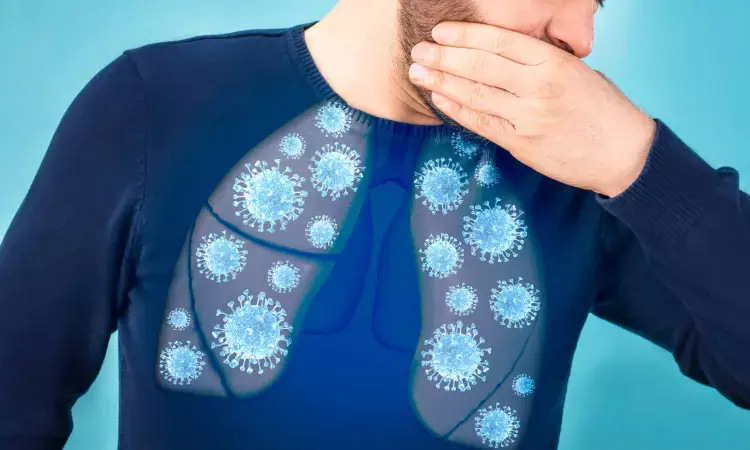- Home
- Medical news & Guidelines
- Anesthesiology
- Cardiology and CTVS
- Critical Care
- Dentistry
- Dermatology
- Diabetes and Endocrinology
- ENT
- Gastroenterology
- Medicine
- Nephrology
- Neurology
- Obstretics-Gynaecology
- Oncology
- Ophthalmology
- Orthopaedics
- Pediatrics-Neonatology
- Psychiatry
- Pulmonology
- Radiology
- Surgery
- Urology
- Laboratory Medicine
- Diet
- Nursing
- Paramedical
- Physiotherapy
- Health news
- Fact Check
- Bone Health Fact Check
- Brain Health Fact Check
- Cancer Related Fact Check
- Child Care Fact Check
- Dental and oral health fact check
- Diabetes and metabolic health fact check
- Diet and Nutrition Fact Check
- Eye and ENT Care Fact Check
- Fitness fact check
- Gut health fact check
- Heart health fact check
- Kidney health fact check
- Medical education fact check
- Men's health fact check
- Respiratory fact check
- Skin and hair care fact check
- Vaccine and Immunization fact check
- Women's health fact check
- AYUSH
- State News
- Andaman and Nicobar Islands
- Andhra Pradesh
- Arunachal Pradesh
- Assam
- Bihar
- Chandigarh
- Chattisgarh
- Dadra and Nagar Haveli
- Daman and Diu
- Delhi
- Goa
- Gujarat
- Haryana
- Himachal Pradesh
- Jammu & Kashmir
- Jharkhand
- Karnataka
- Kerala
- Ladakh
- Lakshadweep
- Madhya Pradesh
- Maharashtra
- Manipur
- Meghalaya
- Mizoram
- Nagaland
- Odisha
- Puducherry
- Punjab
- Rajasthan
- Sikkim
- Tamil Nadu
- Telangana
- Tripura
- Uttar Pradesh
- Uttrakhand
- West Bengal
- Medical Education
- Industry
Seasonal Influenza Vaccination Associated with Reduced Antibiotic Use

Seasonal influenza vaccination has emerged as a powerful tool in the fight against antimicrobial resistance (AMR), potentially curbing the need for antibiotics to treat acute respiratory infections. A recent study published in the Journal of Antimicrobial Chemotherapy found the association between influenza vaccination and antimicrobial use, revealing its potential to reduce unnecessary antibiotic prescriptions.
The study, part of the Vaccine Effectiveness, Networking, and Universal Safety (VENUS) project, focused on patients aged 65 years or older who sought medical attention for upper respiratory infections in Tokyo's 23 wards.
Through meticulous analysis employing the average treatment effect (ATE) and propensity score matching, the researchers made some significant findings. The data encompassed 244,642 individuals, with 101,734 in both the unvaccinated and vaccinated groups.
The study found that the ATE of vaccination was a negative value for the frequency of antibiotic prescriptions, indicating a significant reduction in unnecessary antibiotic use among the vaccinated group. Specifically, the ATE was -0.004 with a 95% confidence interval of -0.006 to -0.002. This suggests that influenza vaccination can help reduce the need for antibiotics in the treatment of upper respiratory infections.
Furthermore, the study indicated that vaccination was associated with lower rates of healthcare facility consultations. The ATE for this parameter was -0.005, with a 95% confidence interval of -0.007 to -0.004. This reduction in consultations also reflects the vaccine's role in mitigating the burden of upper respiratory infections.
The results of this research have important implications for public health. By reducing unnecessary antibiotic prescriptions and healthcare facility visits for upper respiratory infections, seasonal influenza vaccination not only benefits individual health but also contributes to the global effort to combat antimicrobial resistance.
As the world grapples with the growing challenge of AMR, these findings provide valuable insights into the role that routine vaccination against influenza can play in preserving the effectiveness of antibiotics. In an era where antimicrobial resistance poses a significant threat to human health, vaccination strategies like this may prove crucial in managing the appropriate use of antibiotics.
Source:
Tsuzuki, S., Murata, F., Maeda, M., Asai, Y., Koizumi, R., Ohmagari, N., & Fukuda, H. (2023). Association between seasonal influenza vaccination and antimicrobial use in Japan from the 2015–16 to 2020–21 seasons: from the VENUS study. In Journal of Antimicrobial Chemotherapy. Oxford University Press (OUP). https://doi.org/10.1093/jac/dkad340
Neuroscience Masters graduate
Jacinthlyn Sylvia, a Neuroscience Master's graduate from Chennai has worked extensively in deciphering the neurobiology of cognition and motor control in aging. She also has spread-out exposure to Neurosurgery from her Bachelor’s. She is currently involved in active Neuro-Oncology research. She is an upcoming neuroscientist with a fiery passion for writing. Her news cover at Medical Dialogues feature recent discoveries and updates from the healthcare and biomedical research fields. She can be reached at editorial@medicaldialogues.in
Dr Kamal Kant Kohli-MBBS, DTCD- a chest specialist with more than 30 years of practice and a flair for writing clinical articles, Dr Kamal Kant Kohli joined Medical Dialogues as a Chief Editor of Medical News. Besides writing articles, as an editor, he proofreads and verifies all the medical content published on Medical Dialogues including those coming from journals, studies,medical conferences,guidelines etc. Email: drkohli@medicaldialogues.in. Contact no. 011-43720751


